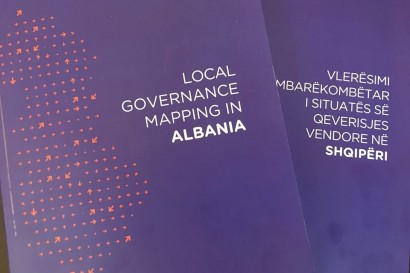National assessment Local Governance Mapping in Albania
Citizens' views about their participation in decision-making that affect their lives
The Institute for Development Research and Alternatives (IDRA) presented the results of the national assessment on "Assessment of the Local Governance Mapping in Albania", in terms of STAR 2 project led by the European Union and including Sweden, Italy, Switzerland and the USAID. During the conference held at Hotel Tirana International, on 17 October 2017, with the participation of the main project partners, the final survey findings were presented in the framework of the implementation "Consolidation of Administrative and Territorial Reform - STAR2" project, initiated in 2016 by the Albanian Government in partnership with United Nations Development Program - UNDP in Tirana. The project combines citizen perceptions and assessments of municipal officials over four dimensions of good governance: Effectiveness and Efficiency, Transparency and Rule of Law, Accountability and Participation and Citizen Engagement. The study includes the 61 municipalities of the country, focused on comparison and combination of techniques of the Local Government Barometer and the Citizen Reporting Charter.
In this innovative challenging and complex study that was conducted for the first time in Albania, IDRA was the leading organization for developing a methodology on assessing local government based on quantitative and qualitative research (for more information please refer to: Local Government Governance Assessment Methodology in Albania). Furthermore, IDRA was responsible for the development of 20 individual municipal reports, as well as for the preparation of the aggregate report 'National Assessment of the Local Governance Mapping in Albania'. In addition to individual and national reports, IDRA conceived and built the 'Online Platform for Assessing the Local Governance Situation'. For more information refer to: http://www.star2lgm.com/.
In his opening remarks, the UN Resident Coordinator and UNDP Permanent Representative Mr. Brian J. Williams, said: “Understanding public views about local government's effectiveness is absolutely critical. Although, the statistics and other measures are necessary to verify and quantify what's happening in service delivery, what's for sure is that the trust in institutions is not there if the public doesn't have positive perceptions about their government. And right now, Albanian institutions need to earn more trust from their citizens."
Stephen Stork, Head of Section on Justice and Home Affairs, Public Reform and Administration, at the EU Delegation in Albania said: “Local and regional authorities are vital to the democratic life of every democratic and modern society. Local self-government performance is also key for good governance since a great part of the EU acquis will be implemented at local level. The mapping offers food for thought to everybody: it should stimulate in particular the policy makers to reflect on how citizens view their own local governments’ efforts and effectiveness in delivering their public mandate.”
In his speech Mr. Auron Pasha, Executive Director of the Institute for Research and Alternative Development, as the leader partner in this project presented the methodology of this assessment as the main findings of the study which highlight many challenges in each of the selected dimensions of governance.
Measured dimensions are estimated from a scale of 0 to 100 and the overall national average shows that 59/61 (97%) of municipalities are rated below 70, 40/61 (66%) below 60 and 10/61 (16%) below 50 showing an average level of local government and considerable room for improvement. Of the four dimensions of governance, municipalities are better at Efficiency and Efficiency and Transparency with a 60/100 result followed by Accountability with a score of 56/100, and Citizen Participation and Commitment with a score of 50/100.
Efficiency and Effectiveness, the internal organization of municipalities and the relations between institutions, the level of satisfaction in municipality services are estimated as average. The data shows a lack of appropriate planning, budgeting and implementation capacity, which is further aggravated by the lack of consolidated and reliable data at the local level and inadequate reporting and performance monitoring systems. Thanks to the existence of internal control mechanisms and systems to respond to oversight bodies to some extent and to citizens' complaints, accountability is estimated as average. The lack of an integrated complaint management system and the inability to track complaints filed is found in many municipalities.
Transparency and Rule of Law is estimated at 56 out of 100. Findings point out the existing shortcomings in accessing information on municipal services, activities and projects. The institutional legal framework guaranteeing equal rights for all citizens is perceived as effective, although raising awareness of local government over local laws and regulations through websites or public media is considered inadequate. The perception of citizens on corruption at the level of local government is assessed as moderate. However, when citizens are asked about their personal experience in the face of corrupt practices, a lower assessment is reported. Local strategies, plans and mechanisms to fight corruption at the local level are judged as inadequate by calling for further interventions.
Participation and Engagement of Citizens is estimated at 50 out of 100 points in all municipalities, thus representing the weakest element of local government. The findings conclude a low culture of democratic participation, fueled by both citizens and local government. In most municipalities, citizens do not see themselves as partners in governance and development. Findings show that municipal officials do not exhibit a strong culture of citizen engagement or view them as uninformed to provide quality advice.
The results show that while there is an improved institutional framework for participation as citizens and municipal officials consider the ability of local civil society organizations to lobby, advocate and influence local administration as inadequate. The platforms and structures available for community participation are assessed as the average and the institutional mechanisms used by Public Consultation and Information Coordinators are partially effective and should be reorganized.







